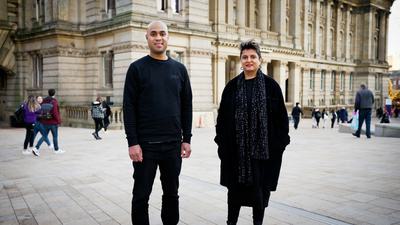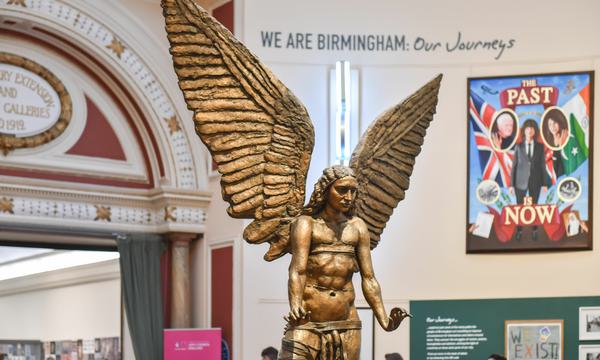New £4 million Digital Good Network aims to ensure technologies are beneficial for societies with Birmingham Museums Trust as a partner
Stories 7 Nov 2022News Story
A new ‘Digital Good Network’ will explore how digital technologies can be used in ways that benefit people, society and the economy.
The Digital Good Network (DGN) will be hosted by the University of Sheffield and will be led by a consortium of universities and cross-sector stakeholders including the BBC and Birmingham Museums Trust.
Funded by the UK’s Economic and Social Research Council (ESRC), the DGN will bring researchers together across disciplines and sectors to generate new insights into the ‘digital good’, and provide digital technology developers, companies and policymakers with the know-how to ensure technologies contribute to the public good.
The DGN will focus on three societal challenges that are crucial to envisioning good relationships with, and through, digital technologies:
- equity: because digital relationships take place in conditions of structural inequity
- sustainability: because planetary challenges like climate change demand that our digital relationships are sustainable
- resilience: because wellbeing, wellness and coping strategies in the face of pandemics, political conflicts, natural disasters, digital misinformation, online hate are important to realise the digital good
Society increasingly relies on digital technologies, with many having become integral to people’s relationships and experiences. Institutions use technologies such as Artificial Intelligence (AI) to make their relationships with the public more efficient; digital platforms can be used to share information and connect to others; and apps are increasingly used to administer our lives.
But those same technologies can also discriminate, or be used to harass or mislead – even the most well-intentioned technologies can end up doing harm. And all of our relationships with digital technologies have both positive and negative effects on the planet.
To help ensure that digital technologies have good societal outcomes, the DGN will produce a Digital Good Index to evaluate digital innovations and ensure good societal outcomes. The index won’t reduce the ‘digital good’ to a simplistic checklist; rather, it will account for how, when, where and for whom digital relationships might be considered good.
The index could be used to help evaluate the success of the Online Safety Bill, which aims to minimise digital harms. It could do the same for other policies, including the National Data Strategy, which emphasises responsible, fair and ethical data uses, and the National Artificial Intelligence Strategy, which focuses on protecting publics and values.
DGN Director, Professor Helen Kennedy from the University of Sheffield, said: “Because technologies can be harmful, it is understandable that to date, there has been more attention to digital harms than to the digital good. But to ensure that digital technologies have good outcomes for people and societies, we need to turn our attention to what the digital good should look like and how it can be achieved.
“I think this is what US critical race scholar Ruha Benjamin means when she says ‘remember to imagine and craft the worlds you cannot live without, just as you dismantle the ones you cannot live within’.”
Birmingham Museums Trust’s Co-CEO, Sara Wajid said: “Museums and cultural institutions have undergone a minor digital revolution during the pandemic and have begun to experiment with thrilling alternative ways of working and democratising access the arts for audiences and creatives. Digital culture and relationships are at the heart of our vision for a more connected and creatively confident Birmingham. We’re thrilled to be part of this dynamic group of researchers to advance the understanding of how digital relationships can promote social justice. "
The research conducted by the DGN will be co-produced and aligns with the needs of policy, industry, practitioner, community and civil society. DGN will:
- distribute funds to support interdisciplinary research projects
- host technology design sprints, workshops and exhibitions
- inform policy, practice and public understanding
- feed into development processes for devices, services and public policy.
DGN Associate Director, Dr Ros Williams from the University of Sheffield’s Department of Sociological Studies, said: “We’ll build our network and build interdisciplinary capability by redistributing around half of our £4m, supporting research, internships, fellowships and training.
“At the heart of this network-building goal is an ambition to achieve better representation from underrepresented groups. This is vital in enabling work to envisage technologies that are good for everyone.”
DGN Reliance Challenge Leader, Dr Abi Millings from Sheffield Hallam University, said: “I’m excited to discover where the interdisciplinarity of this network can take us and I can’t wait to get started. I’ll be overseeing how resilience as a theme can feature in all Digital Good Network activities, and how resilience intersects with equity and sustainability.
“As part of the core team’s research, I’ll be taking a psychological lens and exploring how digital technologies can affect psychological resilience, for good and for ill. One way I’ll do this is through observing the relationship between digital technologies and people’s emotional resilience over time.”



